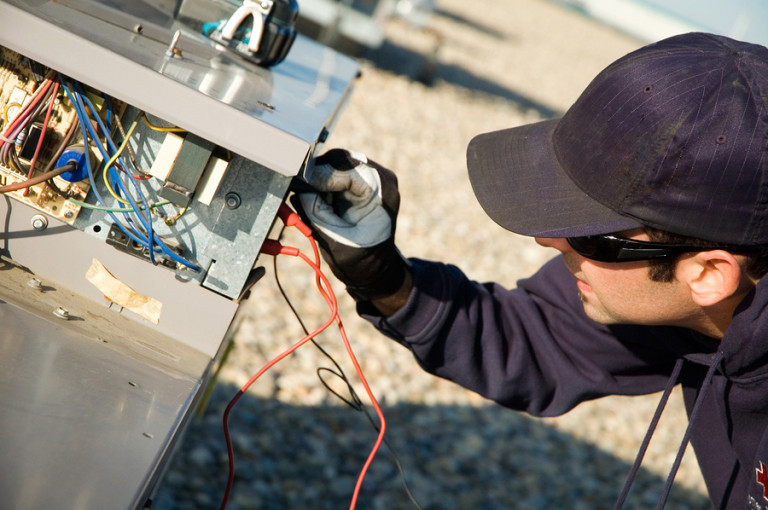
Determining the Best AC SEER Rating for Your Home?
Photo From enhancedheatingandair
Originally Posted On: https://www.enhancedheatingandair.net/what-is-a-good-seer-rating/
Looking for a good air conditioning replacement and you start to realize that most of the choices out there are technically confusing? Well you’re not alone.
While finding the best air conditioning installation services out there is a good idea, it doesn’t make complete sense when you don’t know what an AC SEER rating is.
Would you like to know what is a good SEER rating? Find out below.
What SEER Air Conditioner is Right for My Home?
This is a very common question that many homeowners have struggled with when talking about replacing their old air conditioning unit.
Now, the minimum is 14 SEER based on the State of Delaware requirements. SEER rating options can run up to 25 and the higher the rating, the greater the price tag.
What exactly does SEER stands for?
SEER Rating stands for Seasonal Energy Efficiency Ratio – an efficiency rating of the typical air conditioner cooling output divided by the input of the total electric energy.
Simply put, the higher the SEER rating of an air conditioner unit, the more efficient the unit is.
What SEER Rating You Should Choose to Save More Money in Energy Bills
There are actually lots of determining factors to come up with a decision but there’s only one thing you should keep in mind: the higher the SEER rating of an air conditioning unit, the slower the energy meter will run and the lower the SEER of an air conditioner unit, the faster the energy meter will run.
That means, AC systems with lower SEER rating can give you a bigger energy bill every month.
Most AC units that are 10 years older have a 10 SEER rating at best. However, if they’re in bad condition, then they are probably running at less than 10 SEER rating.
13 SEER vs 16 SEER
Typically, the best AC SEER rating used to replace old air conditioning units with 8 to 10 SEER is a 13 SEER air conditioner. Higher SEER rated units usually cost about 50% or more and don’t always deliver the right energy to make it more cost effective.
In fact, 13 SEER rating AC units can keep the same temperature at your home as higher rated AC units could, such as 16 SEER air conditioner. Your home’s thermal rating also plays a part in decreasing utility consumption.
Keep in mind that if you live in Delaware, the minimum required SEER rating is 14.
To sum it all up, going from a 10 air conditioner SEER rating to a 14 SEER rating is a good idea as it can help homeowners save approximately 29% or $93 per season:

National comparison for 10 SEER rating vs 14 SEER rating.

Delware comparison for 10 SEER rating vs 14 SEER rating.
Going from a 10 SEER rating to a 16 SEER rating is a much better option as it can let you save up to 38% or $122 per AC season:

National comparison for 10 SEER rating vs 16 SEER rating.

Delaware comparison for 10 SEER rating vs 16 SEER rating.
View the Energy Savings Calculator Here. If you’re still not sure about the best SEER rating to look for when upgrading and replacing your HVAC unit, discuss it with your contractor.
Five Ways to Improve the Thermal Rating of Your Home to Maximize Your 14 Seer AC Unit
Consider making these home improvements to improve thermal rating:
- Consider resealing and double insulating your ducts
- Install solar screens and Low E windows
- Install exhaust fan in the attic
- Use radiant barriers for your roof
- Double insulate your ceiling
How Proper Location and Installation of Air Conditioners Affect Their Efficiency
If your air conditioner unit is installed correctly or if any installation problems are properly fixed, there is no doubt that it will perform efficiently for many years with minimum routine maintenance.
On the other hand, most air conditioners are not installed property and because of that, modern air conditioner units labeled as “energy efficient” can perform almost as inefficient as the older AC models.
That’s why, regardless of how energy efficient your AC unit is, make sure that the proper installation process is followed by your contractor when installing new AC systems.
- Make sure your contractor allows adequate indoor space for new installation, repair of the unit, and maintenance, and installs an access door in your furnace or duct for easy maintenance of the evaporator coil.
- They should use duct-sizing methodology.
- Your contractor should ensure that there’s an appropriate amount of supply registers to provide cool air and an appropriate amount of return air registers to efficiently carry the warm air of the house back to the AC unit.
- They should seal all ducts using duct mastic and insulate attic ducts heavily.
- Make sure they install the duct work in a well-conditioned space, wherever possible as long as not in the attic.
- If possible, they should place the condensing unit in a location where the noise won’t keep you or the neighborhood awake at night.
- Place the unit where no nearby objects can block its airflow.
- Your contractor should verify that the AC unit has the exact airflow rate and refrigerant charge specified by the manufacturer.
- Locate the thermostat away from any heat sources, including supply registers or windows.
Determine which AC SEER ratings are the best replacement for your Delaware home by contacting Enhanced Heating and Air Conditioning Services. Call 302-416-4730 today!
Cities we service include Newark, Bear, Wilmington, Dover, Hockessin, Middletown, and Elkton.
Services we offer include Cooling, Heating and Indoor Air Quality Improvements.
